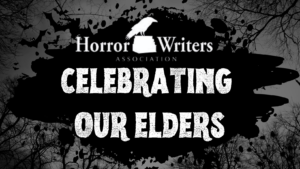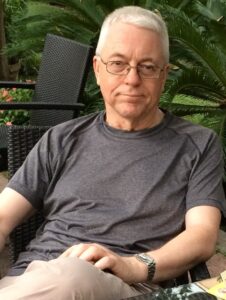Celebrating Our Elders: Interview with Stephen Gallagher


Photographer’s Credit: Marilyn Gallagher
Stoker and World Fantasy Award nominee, winner of British Fantasy and International Horror Guild Awards for his short fiction, Stephen Gallagher has built a career both as a novelist and as a creator of primetime miniseries and episodic television. In the US he was lead writer on NBC’s Crusoe and creator of CBS Television’s Eleventh Hour. His fifteen novels include Chimera, Oktober, and Valley of Lights. He’s the creator of Sebastian Becker, Special Investigator to the Lord Chancellor’s Visitor in Lunacy, in a series of novels that includes The Kingdom of Bones, The Bedlam Detective, and The Authentic William James. http://www.stephengallagher.com
Did you start out writing or working in the horror field, and if so why? If not, what were you writing initially and what compelled you to move into horror?
I got my professional start in radio drama with science fiction and thrillers and an early TV gig on Doctor Who, but even then I could see that this wasn’t my real path. Not in prose fiction, anyway, which is where I really wanted to make a mark. I’d read a lot of SF in my teens but all the new work seemed to be from writers with the hardest of hard science backgrounds, speculating on a level I could never hope to reach.
But then the strands of what I’d been doing came together in a way that I hadn’t predicted, with a genetic thriller that echoed themes of Mary Shelley and Moreau in a present-day setting. I ran the idea past my first agent and she encouraged me to run with it. That was Chimera, and it set me on the horror track. I researched the science but it was the darker implications of the story that gripped me. I began to sense how there are story patterns that tap into the human subconscious at the deepest levels, universal patterns of fear and desire. They can play in any genre but horror’s where they flourish.
Who were your influences as a writer when you started out and who, if anyone, continues to influence you?
By the grace of the junior library and the Salford market comic book stand I came in with a solid classical education in Wells, Conan Doyle, Poe, Ambrose Bierce, and Famous Monsters of Filmland. Anthologies were great for exploring and I was drawn mostly to the horror of commonplace settings. Lovecraft didn’t grab me, and for Machen and Dunsany the most I can say is that I was “aware of their work” (which was Stephen King’s diplomatic response when I asked our publisher to comp him a copy of The Boat House).
Back in the 80s we all wanted to be Stephen King. The immediacy of the voice, the deceptive facility of the storytelling, and the coexistence of the humanity and the horror. And his personal success had an impact on publishing that opened the way for so many. Peak King for me was The Dead Zone but it was the nonfiction Danse Macabre that started a ripple effect when he wrote of Psycho, “We know that Norman is only outwardly the Werewolf when he’s wearing Mom’s duds and speaking in Mom’s voice; but we have the uneasy suspicion that inside he’s the Werewolf all the time.” There it was; you didn’t have to write the Monster to write about the monster.
Then John Farris, Peter Straub. Jonathan Carroll. Shirley Jackson. George R R Martin’s Fevre Dream, Tom Reamy’s Blind Voices. With most of my contemporaries, I’d be reading forensically, picking apart what they were doing in order to understand how they were doing it. But with these people, I’d lose track of time and forget that I was even reading. As for a continuing influence, I keep referring back to that juggernaut dilettante Conan Doyle. I tend to read more women authors now, often more genre-adjacent than genre. Off the top of my head, Sarah Hall, Jo Baker, Silvia Moreno-Garcia, and I’m catching up on Catriona Ward.
How have the changes in horror publishing over the past decades affected you?
I had a lucky piece of timing around ’86. A new agent took me on and sent Valley of Lights to Hodder and Stoughton just as they were revitalising the New English Library’s horror list. I’d had one bestseller and by now I had one flop and two unpublished novels to my name; three, if you count Valley itself. It was a tough time. That I didn’t lose heart is largely thanks to Ed Ferman of The Magazine of Fantasy and Science Fiction buying my short stories and allowing me to believe that I still ‘had it’. Valley of Lights saw the start of a wonderful decade-long run with NEL, but when Headline Publishing bought Hodder I sensed a change coming and took an offer from Bantam. The instinct wasn’t wrong; Headline dropped most of their horror writers along with key editorial staff. From now on marketing would be steering editorial, in a reverse of tradition. Unfortunately, I screwed up the follow-up to Red, Red Robin and my time at Bantam was short-lived.
But it was the start of another decade-long chapter for me, this one in British TV where I got to adapt and direct my own stuff as well as working on an eclectic range of dramas. You may have gathered by now that I’m a kid-in-a-toyshop kind of writer, eager for a go at everything I’ve ever consumed and loved. This time my prose-side morale was buoyed up by Bill Schafer at Subterranean Press. Meanwhile, a TV company paid for me to follow the trail of Henry Irving’s 1903 theatre tour from Philadelphia to New Orleans for a project involving Bram Stoker that eventually spawned my first historical novel, The Kingdom of Bones.
I seriously never expected that book to sell. But after a bidding war I got a two-book contract with Shaye Areheart for her eponymous Random House imprint. I set to work on the follow-up but then the Random House situation kind of unravelled. Shaye was edged out and her imprint closed down and The Bedlam Detective spent a couple of years in limbo before coming out to the best reviews of my career. Kirkus named it one of the 100 best books of the year. To no avail; they wouldn’t take another.
Do you think you’ve encountered ageism? If so, how do you counteract or deal with it?
When I moved into my LA apartment in 2009 I had a waiting mailshot from the Writers’ Guild inviting me to share my experiences of ageism in the business. The issue’s real but right then the question seemed ironic. Jerry Bruckheimer had bought remake rights to a show I’d created, a scary-science descendant of Chimera titled Eleventh Hour. So here I was, breaking into Hollywood at fifty-five. I came to the view that if you’ve got something they really want, the rest falls away.
But if that hadn’t happened I can imagine a much colder experience. The spotlight’s always moving and your long-term place in it is never assured. If I’ve managed to counteract or dealt with that, it’s been with a big dose of luck and a readiness to bounce. Of late I’ve found myself on a couple of projects where there’s a mentoring element with younger teammates. That feels like a natural progression and I’m quite OK with it.
What do you wish you knew when you were just getting into the field?
That’s a hard one to answer. Every ill-judged move and bad experience has been the springboard to something really good that wouldn’t have happened otherwise. So the honest answer for me has to be, nothing.
Do you have any advice for writers just starting out?
I was asked this in a college Q&A and when I said, “Don’t put your faith in Creative Writing courses,” the size of the laugh made me realise that the question had come from the guy who taught the Creative Writing course. And then I felt mean.
And I was probably being unfair, too. The world has changed a lot since I was starting out, so I don’t know. My instinct is that a study of literature and wide reading come before a taught writing course. I’m sure there must be some that include coverage of basic tools like narrative structure and grammar and briefings on industry practices; the ones I knew of back in the day came over more like group therapy.
As for advice… I have a theory that we start out by imitating what we love, and as we work at it we’ll start to see our own style and themes coming through. Be alert for that.
Research your subjects. And learn to bounce.
Do you think older characters are represented fairly and honestly in horror fiction?
It’s not something I pay attention to. Now that I’m older, am I looking to find representation in stories? No, I’m not. I’ll empathise with any age of character whose experience I can connect to on some level. Good writing will always offer that connection.
What are some of your favorite portrayals of older characters?
Interview with the Vampire’s Claudia is a haunting one, 170-something years old and forever locked in the body of a five-year-old child. It’s a jarring disruption of the natural order and when you know the background it makes a poignant commentary on the author’s personal grief and loss.
Nearer to home; the elderly characters are well-realised and central to Peter Straub’s Ghost Story, which I read and loved when I was pretty young. And Joe Lansdale’s Bubba Ho-Tep… well, need I say more.
But let me stretch the frame and say, Odysseus. The guy fights a war, blinds a cyclops, goes to hell, beds a witch, gets taken for an old beggar when he shows up at home and wipes the floor with the younger competition. Meanwhile, there’s Penelope, holding the fort and outwitting the same dudes on a daily basis. The greatest older characters are the ones who’ve been on the biggest journeys. The Greeks knew all about that.
Do you have anything you’d like to add that we haven’t asked?
I’ll put up with getting older under one condition. That Liam Neeson plays me in the movie.



